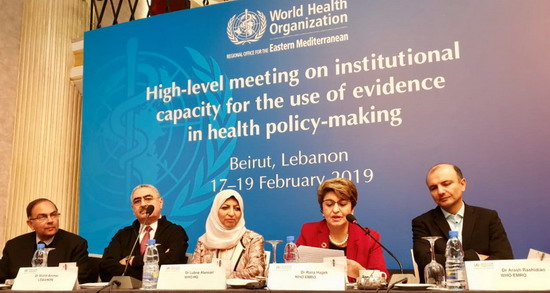
17 February 2019, in Beirut, Lebanon ‒ The World Health Organization (WHO) Regional Office for the Eastern Mediterranean is convening a major event to bridge the gap between academic research, other valid sources of evidence and policy-making to improve population health in the Region.
The high-level meeting on institutional capacity for the use of evidence in health policy-making is taking place from 17 to 19 February 2019 in Beirut, Lebanon.
Participants at the 3-day session are examining the best ways of translating different sources of knowledge into practical policy in the Region, and will also elaborate and discuss the outcomes of recent WHO-led surveys on evidence generation and utilization for health policy-making.
The meeting marks another step in WHO’s ongoing efforts to better develop and use health research to identify and meet policy needs in the Eastern Mediterranean Region. Recent analysis by the Organization revealed serious gaps. Information on the best modalities and approaches to encourage using research-generated evidence by health-policy makers is patchy, and there has been little assessment of the capacity to develop and utilize health research in policy-making.
“Despite growing global recognition of the importance of utilizing research evidence in health policy-making, our Region ranks second lowest in the world in terms of financial investment in health research and development. There is an urgent need to look at the health policy-making community in the Region and attempt to assess institutionalized evidence-informed health policy-making,” said Dr Ahmed Al-Mandhari, WHO Regional Director for the Eastern Mediterranean.
During the meeting, participants will review the status of health research and research-to-policy activities in the Region, and also consider barriers to uptake of WHO’s global guidelines in this area of research due to the wide variety of contexts and cultures across WHO’s 6 regions and their Member States.
Dr Arash Rashidian, WHO’s Director of Information, Evidence and Research in the Region, explained that the meeting’s agenda covered a range of issues, including scientific research as a source of evidence for policy, key modalities for turning evidence into policy (e.g. health technology assessment), and the development, adaptation and implementation of national guidelines. “This is the first time that we are discussing all key sources of evidence for policy in an overarching approach. This will enable us to identify key policies and interventions that help countries to institutionalize further use of evidence in health policies,” noted Dr Rashidian.
Promoting the systematic use of evidence, especially research-generated evidence, in health policy-making will help to ensure rational resource allocation, selection of interventions, delivery of health care services and control of community health problems. This in turn will strongly support the achievement of targets set forth in WHO’s new vision for health in the Region, Vision 2023, which calls for health for all by all, and also aligns with the Organization’s recently adopted global strategy, the "Thirteenth General Programme of Work" (GPW 13), in particular its focus on universal health coverage.
The distinguished meeting participants will also examine: analysis of decision-makers’ perceptions and practices about evidence-informed decision-making; policy development processes and the use of evidence; research and development as a source of evidence for decision-making; and institutional capacity for the use of research evidence in decision-making – modalities and approaches.
About 60 experts from the Region and beyond are participating in the meeting, which is expected to generate a consensus on the key concepts and elements of a regional strategy for enhancing and scaling-up institutional capacity and modalities for using evidence in health policy-making.








